Valletta, the captivating capital of Malta, is a city steeped in a rich history that’s intertwined with the legacy of the Order of Saint John. From the ornate Triton Fountain marking its gateway to the panoramic views from the Upper Barrakka, this UNESCO World Heritage site showcases Baroque splendor and intricate stonework. But beneath the city’s opulent façade lies a complex social fabric shaped by the plight of captive slaves and the influence of noble mistresses. Explore this juxtaposition of power and subjugation on a walking tour that promises to reveal Valletta‘s captivating past.
Key Points
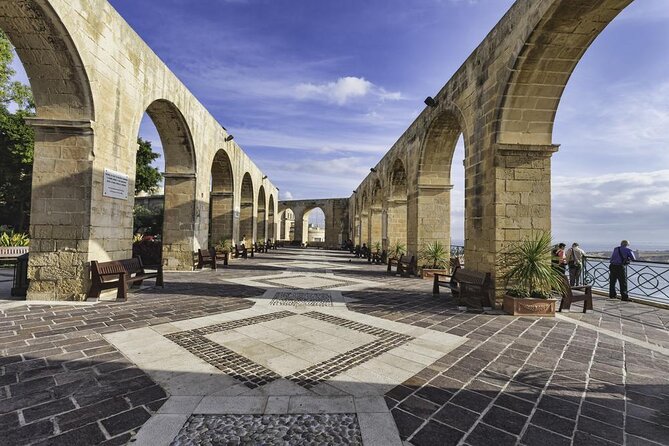
- The Triton Fountain serves as a captivating gateway to Valletta, a UNESCO World Heritage site with a rich history and architectural wonders.
- Valletta’s iconic architecture blends Baroque, Neoclassical, and Knights of St. John influences, showcasing grand palaces, imposing fortifications, and the magnificent St. John’s Co-Cathedral.
- The Order of Saint John left an indelible mark on Valletta’s Baroque architecture, intricate stonework, and grand public spaces, though their wealth and power were often built on the exploitation of captive slaves.
- Valletta’s complex social fabric included both the lavish lifestyles of the knights’ noble mistresses and the plight of the subjugated captive slaves forced to toil in the households of the powerful.
- The Upper Barrakka offers panoramic views of Valletta’s iconic landmarks and the surrounding Grand Harbour, providing a fitting conclusion to the walking tour and a deeper appreciation for Malta’s captivating capital.
Triton Fountain: Gateway to Valletta
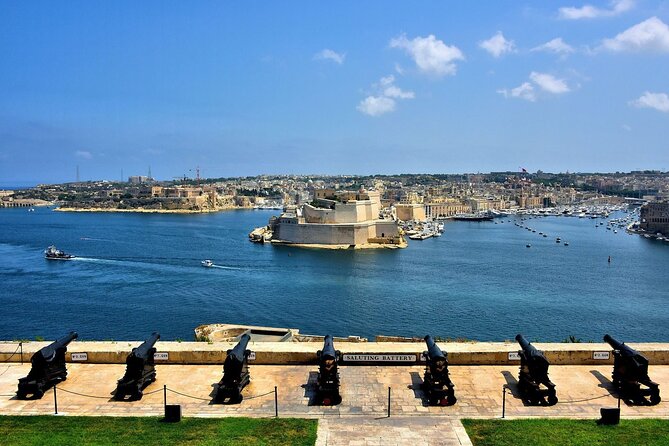
The Triton Fountain, an ornate and imposing structure, welcomes visitors to the historic city of Valletta, serving as the vibrant gateway to this captivating destination.
As you approach the fountain, you can’t help but marvel at the intricate sculptural details that adorn its surface. Three magnificent bronze Tritons, mythical sea creatures, spout streams of water into the circular basin below, creating a mesmerizing display.
The fountain’s grandeur sets the stage for the journey ahead, hinting at the rich history and architectural wonders that await within the city’s walls. It’s a fitting introduction to Valletta, a UNESCO World Heritage site that promises to enchant and enlighten all who explore its streets.
If you're enjoying exploring Malta on foot, you'll love these other walking tours we recommend
Valletta’s Iconic Architecture and History
As you wander through Valletta’s historic streets, you’ll be captivated by the city’s iconic architecture, which seamlessly blends Baroque, Neoclassical, and Knights of St. John influences.
Ornate facades, grand palaces, and imposing fortifications line the walkways, each structure a testament to Malta’s rich and turbulent past.
The magnificent St. John’s Co-Cathedral, with its intricate golden interiors, stands as a prime example of the Knights’ opulent legacy.
Nearby, the magnificent Grand Master’s Palace, once the seat of power, now houses impressive state rooms and an armory showcasing the knights’ military prowess.
Throughout the city, you’ll discover hidden gems, from quaint alleyways to panoramic viewpoints, each offering a glimpse into Valletta’s captivating history.
The Order of Saint John
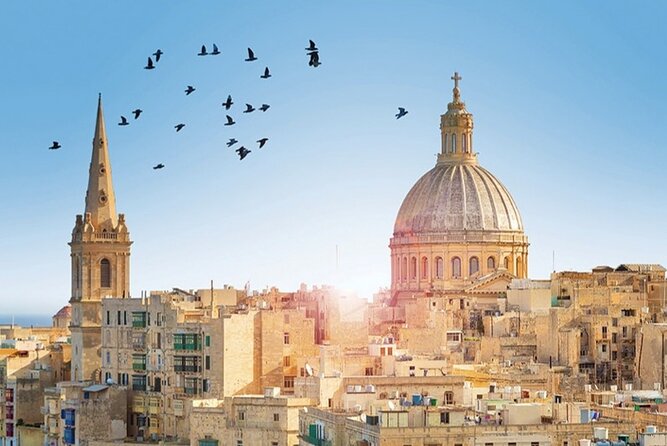
Integral to Valletta‘s history and architecture are the Knights of the Order of Saint John, who left an indelible mark on the city during their long and influential reign.
These elite warriors and noblemen arrived in Malta in 1530, after being expelled from their previous home in Rhodes. They turned Valletta into a fortified capital, constructing imposing buildings and magnificent churches that remain the city’s most iconic structures.
The Knights’ legacy can be seen in the stunning Baroque architecture, intricate stonework, and grand public spaces that define Valletta’s aesthetic. Their impact is felt even today, with the order’s coat of arms and symbols woven into the fabric of the city they once ruled.
Captive Slaves and Noble Mistresses
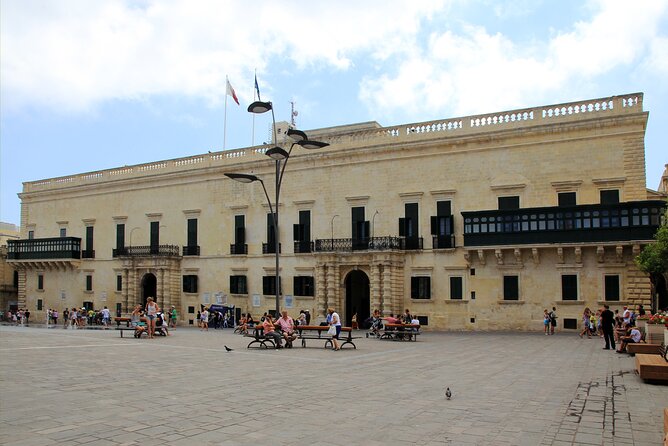
Captive slaves and noble mistresses were integral to Valletta’s complex social fabric, their lives intertwined with the city’s ruling elite. The Knights of the Order of Saint John, who commanded vast wealth and political influence, often exploited the labor and bodies of the less fortunate, creating a stark contrast between the lavish lives of the aristocracy and the plight of the subjugated.
Slaves, many of them captured during the Knights’ naval campaigns, were forced to toil in the households of the powerful, while the mistresses of the knights enjoyed luxurious lifestyles, their status and privilege dependent on their relationship with their illustrious patrons.
This juxtaposition of opulence and subjugation was a defining feature of Valletta’s social landscape.
Upper Barrakka: Panoramic Views of Valletta
After exploring Valletta’s complex social dynamics, the walking tour leads visitors to the Upper Barrakka – a lofty vantage point that offers panoramic views of the city’s iconic landmarks and the surrounding harbor.
From this elevated perch, guests can:
- Gaze out at the imposing Grand Harbour, its glistening waters dotted with bobbing boats and yachts.
- Admire the stunning Baroque architecture of the historic city, with its ornate facades and towering church spires.
- Spot the iconic Siege Bell War Memorial, a striking monument commemorating Malta’s heroic resistance during World War II.
This panoramic overview provides the perfect conclusion to the walking tour, leaving visitors with a deeper appreciation for Malta’s captivating capital.
Exploring Valletta’s Picturesque Alleyways
Valletta Walking Tour, Knights, Slaves and Mistresses
Exploring Valletta’s Picturesque Alleyways
As visitors meander through Valletta’s picturesque alleyways, they’re enchanted by the city’s charming blend of quaint shops, cozy cafes, and historic landmarks that line the narrow, winding streets.
Around every corner, there’s a new discovery – a hidden courtyard, a centuries-old doorway, or a vibrant mural adorning a weathered wall. The guide points out architectural details and shares intriguing stories that bring the city’s past to life.
Wandering through these charming backstreets, travelers feel transported to a bygone era, immersed in Valletta’s rich culture and heritage. It’s an intimate exploration that allows visitors to truly experience the heart and soul of this captivating Mediterranean capital.
Highlights of the Walking Tour
As the walking tour progresses, visitors are treated to an up-close look at Valletta’s most iconic landmarks and historic sites. The guide leads the group through the city’s winding streets, expertly weaving in captivating tales about Malta’s rich past.
The majestic St. John’s Co-Cathedral, renowned for its ornate Baroque interior and the masterful paintings by Caravaggio.
The serene Upper Barrakka Gardens, offering panoramic views of the Grand Harbour and the historic Three Cities across the water.
The elaborate Grandmaster’s Palace, a stunning example of Maltese architecture and the former seat of power for the Knights of St. John.
The charming market square, bustling with local vendors and a lively atmosphere that transports visitors back in time.
Practical Information and Logistics
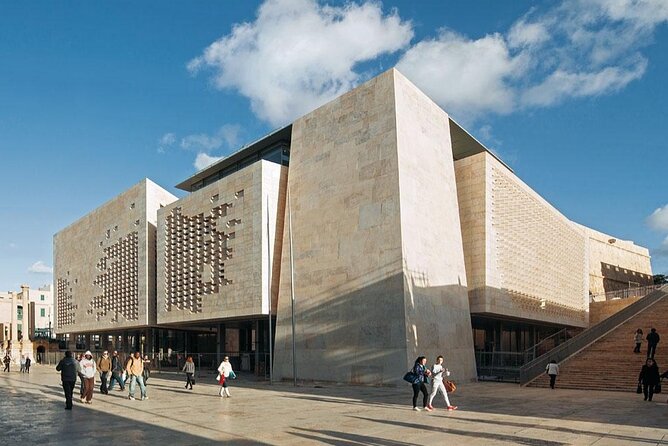
The walking tour starts at the iconic Triton Fountain, located in front of the VisitMalta Tourist Information center. Participants gather here to meet their licensed tour guide, who leads the group on an immersive exploration of Valletta’s most captivating sights.
The tour culminates at the scenic Upper Barrakka, offering panoramic views of the stunning Grand Harbour. Throughout the experience, the guide shares fascinating insights about Malta’s unique history and culture.
Wheelchair and stroller users can easily join the tour, which is accessible via public transportation. With a maximum of 10 travelers, the group size ensures a personalized and intimate experience.
Cancellations are eligible for a full refund up to 24 hours before the tour.
Frequently Asked Questions
How Does the Tour Accommodate Guests With Disabilities?
The tour is wheelchair/stroller accessible, allowing guests with disabilities to join. Service animals are also welcome. The small group size of up to 10 travelers further ensures a comfortable experience for all.
Are There Any Age Restrictions for the Walking Tour?
The tour has no age restrictions, so folks of all ages can join. Kids are welcome, though the walking may be tiring for little ones. As long as you can comfortably stroll for a couple hours, you’re good to go.
Can Participants Take Photos During the Tour?
Participants can absolutely take photos during the walking tour. The guide encourages it, as the picturesque locations make for great photo opportunities. Just be mindful not to obstruct the group or slow down the pace of the tour.
What Is the Maximum Group Size for the Walking Tour?
The tour has a maximum group size of 10 travelers. This allows the guide to provide a more personalized experience and ensure everyone can easily hear the insights shared during the walking tour.
Are There Any Health and Safety Measures in Place During the Tour?
The tour provider follows health and safety guidelines, with a maximum group size of 10 travelers. Face masks may be required, and social distancing is encouraged. The tour is wheelchair and stroller accessible, ensuring an inclusive experience.
Recap
Valletta’s Baroque splendor and captivating history come alive on this walking tour. From the ornate Triton Fountain to the panoramic views from the Upper Barrakka, visitors will explore the architectural wonders and complex social fabric of the city, shaped by the legacy of the Order of Saint John, captive slaves, and noble mistresses.
Whether strolling through the picturesque alleyways or marveling at the juxtaposition of opulence and subjugation, this tour offers a glimpse into Valletta’s fascinating past.
More Walking Tours in Malta
More Tours in Malta
More Tour Reviews in Malta
- Scenic Tour by Vintage Bus to Buskett Garden & Dingli Cliffs
- MALTA Comino BlueLagoon Private Boat trips
- Malta: Gozo & Comino Islands, Blue Lagoon & Seacaves Tour
- St. Julians: Parasailing Go & Fun with Free Photos & Videos
- Malta: Sunset Group Tour with Pro Photographer
- Private Charter to Comino & Surroundings
Not for you? Here's more things to do in Malta we have recnetly reviewed
- Malta: Photography Group Tour with Pro Photographer
- Wine with Maltese Grapes TOUR IN PORTUGUESE
- Gozo Unveiled: Guided Hiking in Comino Island
- Malta: Half/Full Day Tour Minibus Up to 25pax
- Malta: Comino, Blue Lagoon, Crystal Lagoon & Caves Cruise
- Malta: Private Full-Day Sightseeing Tour
- Reggaeton Party at UNO Malta – GIRL POWER
- Valletta and 3 Cities Private 4-Hour Shore Excursion
- Hike & Beach – Discover Malta’s Nature
- Gozo – Funtastic Daytrips –
- Gozo Island: Shared Sunset Jeep Tour & Comino Visit
- Malta: Marrige Proposal with Scenic Views and Picnic
